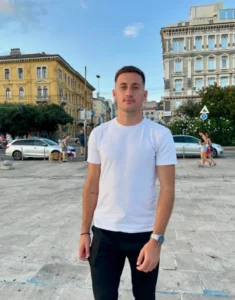The quiet TikTok king known for his expressive shrug and sarcastic simplicity has finally spoken—without words, but with presence. After a surprising detainment by U.S. Immigration and Customs Enforcement (ICE) and a swift voluntary exit from the United States, Khaby Lame, the most followed person on TikTok, has broken his silence in the most Khaby-esque way possible: calm, unshaken, and online.
This is not just another celebrity travel hiccup. It’s a story that weaves through global fame, immigration law, politics, and the power of influence—on and off the screen.
From Viral Fame to Visa Trouble
Khaby Lame, born in Senegal and raised in Italy, skyrocketed to global fame during the pandemic with his short-form comedy videos that mock unnecessary life hacks. Without saying a single word, he amassed over 160 million followers on TikTok, becoming the platform’s most followed personality.
But fame doesn’t come with immunity from international law.
According to U.S. immigration officials, Lame entered the United States in late April 2025 under a short-term visitor visa, allegedly tied to an appearance at the Met Gala and promotional events in Los Angeles. What followed was unexpected: by early June, he had overstayed the visa, prompting ICE to detain him at Harry Reid International Airport in Las Vegas.
The detention was brief and reportedly civil. Lame was given the choice to voluntarily leave the country without a formal deportation, which he accepted. Within 24 hours, the TikTok sensation was back on a plane—leaving behind a media firestorm and unanswered questions.
A Detainment Sparked by a Political Influencer?
The plot thickened when conservative teen influencer Bo Loudon, known in right-wing circles and for his ties to the Trump family, claimed on social media that he was behind Lame’s removal.
Loudon, who describes himself as a “patriot activist,” posted screenshots allegedly showing emails and calls with ICE, saying he tipped them off after “learning” that Lame had overstayed his visa. His reason? “No one is above the law, not even influencers who make silly faces for money,” he said in a now-deleted video.
The move sparked outrage online, with critics accusing Loudon of targeting a non-political, apolitical immigrant for clout. Hashtags like #LetKhabyStay and #VisaNotViolence trended briefly on TikTok and X (formerly Twitter).
Whether Loudon actually triggered ICE’s involvement or not remains unclear. Officials have declined to confirm the source of the tip, citing privacy protocols.
Khaby Speaks—Through Action, Not Outrage
While the social media world debated, Khaby Lame took a different approach.
Just a day after his reported exit from the U.S., Lame shared a cheerful photo of himself with Will Smith at the Bad Boys: Ride or Die premiere. The caption: “Grateful to be part of something great.” No mention of ICE. No political jab. No drama.
Shortly after, he appeared in São Paulo, Brazil, kicking soccer balls with children in a favela, accompanied by AC Milan player Emerson Royal. The event provided food donations to over 200 families. Khaby, ever the silent star, smiled, signed autographs, and posed with fans—seemingly unfazed by the controversy.
His management has not directly commented on the ICE incident, choosing instead to emphasize Lame’s “global movement of positivity.”
Immigration, Fame, and the Fragility of Visa Status
The U.S. immigration system can be unforgiving—even for billion-view celebrities. Visa overstays, even by days, can result in detainment, bans, and future travel restrictions. For someone of Khaby’s stature, such an issue can derail appearances, brand deals, and even long-term career planning in the U.S.
Legal experts note that while voluntary departure spares Lame from a formal deportation record, it still leaves a trail. “There’s a fine line between harmless delay and immigration violation,” said Dr. Maya Kroll, an international immigration attorney. “Even celebrities have to be extremely cautious.”
The ICE incident has prompted larger questions in the influencer world: How are international creators being advised on travel compliance? And could they be easy targets in the current political climate?
Political Climate: A Warning for Public Figures?
Since President Trump returned to office in January 2025, immigration enforcement has intensified under what the administration calls the “Zero Tolerance 2.0” initiative. Focus has turned not only to border crossings but also to overstays—people who enter legally and remain after their visa expires.
Khaby’s situation, publicized by a teen political influencer, plays directly into this new era of enforcement: where viral fame makes someone more visible, more accountable—and perhaps more vulnerable.
While some see this as a just enforcement of immigration law, others argue that it’s being selectively and performatively applied, especially when influencers like Loudon seek to frame such actions as political victories.
What’s Next for Khaby?
Lame’s team is reportedly reviewing legal pathways for reentry to the U.S., possibly under an O-1 visa—a category designated for individuals with “extraordinary ability.”
Meanwhile, Khaby continues posting content from Brazil and Italy, collaborating with global brands, and staying connected with fans. While the U.S. may be temporarily off-limits, his influence stretches across continents.
Whether or not he chooses to publicly address the ICE controversy in words remains to be seen. But in his signature style, perhaps he doesn’t need to say anything. The message is clear: Khaby is still here, still relevant, and still shrugging at the absurdity of the world.
Final Thoughts: The Silent Star in a Loud World
Khaby Lame’s brief detention didn’t just stir up a media storm—it revealed how deeply interconnected fame, politics, and immigration have become. In an era where even your visa status can go viral, Khaby’s calm composure is a quiet rebellion.
He didn’t rant. He didn’t lash out. He did what he always does—he made people smile. And sometimes, that’s the loudest message of all.







